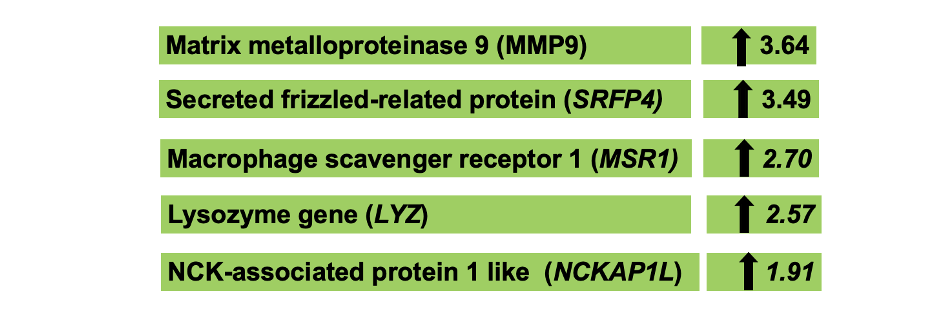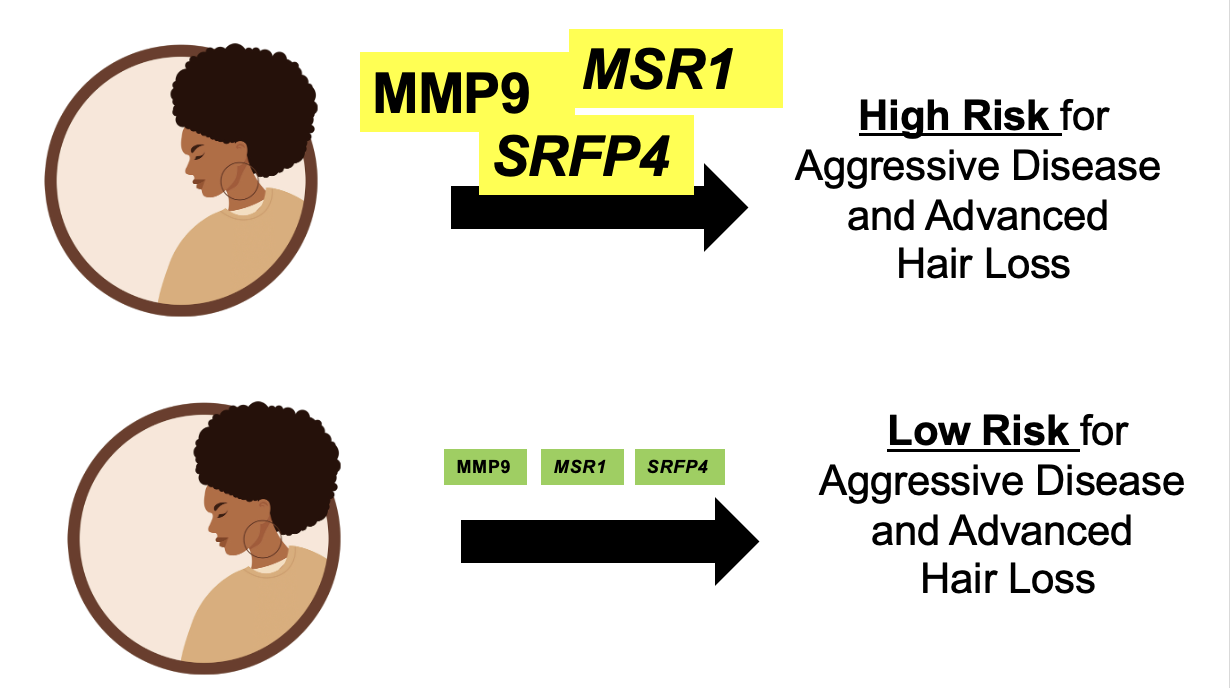5 Genes Highlighted to Drive More Aggressive Forms of CCCA
MP9, SFRP4 MSR1 1 LYZ and NCKAP1L May Play A Role in Driving Hair Loss in CCCA
A new study highlights the possibility that that precise set of genes that a patient with CCCA has may influence whether they develop mild hair loss or progressive rapidly to more advanced hair loss. It’s clear in the clinic that a wide variety of different CCCA disease phenotypes are seen.
Researchers set out to evaluate changes in gene expression in mild, moderate and severe CCCA. 16 patients were included in the study. Patients were grouped into the following disease severity categories based on clinical examination at the time of tissue sample collection: focal (stage 1A through 2B), limited (stage 3A through 4B) and extensive (stages 5A and 5B) disease. A standard 4-mm punch biopsy was obtained from the affected hair-bearing areas of the affected vertex scalp. Biopsies were then submitted for RNA isolation and microarray analysis. Patients in the study had either never received treatment in the past or had not received treatment for at least 1 year at the time of tissue specimen collection.
Six patients had focal disease, seven patients had limited disease, and three patients had extensive disease based on clinical examination at the time of tissue sample collection. Patients ranged from ages 27 to 70, with disease duration prior to biopsy ranging from months to decades. Patients with extensive CCCA had a median time from disease onset to stage 5A or 5B involvement of 5 years.
Two-hundred genes with the highest fold change in the lesional compared to non-lesional scalp of CCCA patients were identified. Expression patterns of these 200 genes were then assessed based on disease se- verity.
Five Genes Upregulated in Advanced CCCA
Twelve genes were preferentially expressed in the lesional scalp of CCCA patients compared to non lesional scalp and also consistently upregulated with increasing severity of disease. However, the authors found that there were five genes that were statistically more likely to be upregulated. These were MMP9, SFRP4, MSR1 1, LYZ and NCKAP1L. These genes are short for matrix metalloproteinase 9 gene (MMP9), secreted frizzled-related protein gene (SRFP4), macrophage scavenger receptor 1 gene (MSR1), Lysozyme gene (LYZ) and NCK-associated protein 1 like gene (NCKAP1L).
Conclusion
This is an interesting study with some new insights. The authors propose that severe, extensive CCCA is potentially both clinically and biologically distinct from mild CCCA, and is characterized by increased expression of MMP9, SFRP4, MSR1 , LYZ and NCKAP1L in the scalp of CCCA patients.
What exactly do these 5 genes do?
a) MMP9 is thought to have a stimulatory role in fibrosis
b) MSR1 is thought to have a role in macrophage-mediated pro-inflammatory processes including Alzheimer's disease and atherosclerosis
c) SFRP4 is a modulator of the Wnt signalling pathways, which have been implicated as a key mediator of hair follicle development. It has an important function in wound healing and fibrosis.
d) Lysozyme gene (LYZ) is an antimicrobial agent and is not current thought to have a role in fibroproliferative diseases. It may be involved in innate immune system
e) NCK-associated protein 1 like gene (NCKAP1L) has a role in cell signalling, neutrophil migration, phagocystosis and lymphocyte development. Defects cause hyperinflammation and immunodeficiency.
The authors point out that patient’s with advanced CCCA may not simply be patients that didn’t get treatment on time. Some forms of CCCA may be programmed to take on an aggressive course from the very beginning and some may be programmed to stay somewhat mild.
With this information, it theoretically could be possible someday to identify patients who are likely to have an aggressive course with rapid hair loss and extensive hair loss and at the same time those who may not. The importance of identifying those with aggressive forms of course, is to be able to connect them quickly to the aggressive treatment options.
A new study highlights the possibility that women with certain genes, including those regulating fibrosis may be at increased risk for developing extensive hair loss in CCCA
Although the top 3 genes identified in this study have a role in fibrosis, it’s still controversial where exactly to place the role of fibrosis in CCCA. One study suggests that women with CCCA may have a general abnormality of fibrosis and may for example have an increased risk of uterine fibroids. That study suggested that CCCA could be one of the fibroprolferative disorders. However, recent study by Samroa and colleagues called this into question as the authors did not find a risk of fibroprolerative diroders.
More studies are needed to better understand these role of fibrosis and if intervention in this area though blocking fibrosis could clearly be shown to impact the disease.
REFERENCE
Jamerson et al. Gene expression profiling suggests severe, extensive central centrifugal cicatricial alopecia may be both clinically and biologically distinct from limited disease subtypes Exp Dermatol. 2022 Jan 10.
This article was written by Dr. Jeff Donovan, a Canadian and US board certified dermatologist specializing exclusively in hair loss.



